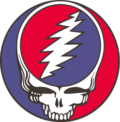The Grateful Dead’s music is often described as a psychedelic odyssey, a journey through sonic landscapes where boundaries blur and reality shifts. Rooted in the counterculture of the 1960s, the Dead’s sound reflects the era’s ethos of experimentation and exploration.
Central to the Grateful Dead’s psychedelic aesthetic is their improvisational approach to music. Drawing from a diverse array of influences, including blues, folk, and jazz, the band created a sound that defied categorization, constantly evolving and morphing with each performance. At the heart of their improvisation was a deep sense of musical telepathy, an intuitive connection between band members that allowed them to communicate and collaborate in real-time, weaving intricate tapestries of sound.
But the Grateful Dead’s psychedelic journey extended beyond the confines of their music. Their concerts were multimedia spectacles, featuring elaborate light shows, mind-bending visuals, and a sense of communal camaraderie that transformed each performance into a transcendent experience. Audience members didn’t just attend Grateful Dead concerts; they participated in them, becoming active participants in the collective creation of music and magic.
Beyond the music and the spectacle, the Grateful Dead’s psychedelic odyssey embodied a larger cultural movement, a quest for spiritual enlightenment and personal liberation. In a world marked by social upheaval and political unrest, the Dead offered a glimpse of an alternate reality, a space where boundaries dissolved, and possibilities were endless.
Article 3: The Enduring Influence of the Grateful Dead
More than fifty years since their formation, the Grateful Dead’s influence continues to resonate across the musical landscape. Their legacy can be heard in the music of countless artists spanning genres as diverse as rock, folk, jam, and electronic. But beyond their musical impact, the Grateful Dead’s ethos of community, creativity, and adventure remains as relevant today as ever.
One of the most enduring aspects of the Grateful Dead’s legacy is their commitment to live performance. The band’s concerts were legendary affairs, marathon events that stretched late into the night and beyond. But more than just musical performances, Grateful Dead concerts were communal gatherings, where fans from all walks of life came together to celebrate their shared love of music and culture.
In addition to their music, the Grateful Dead were pioneers in the realm of technology and innovation. From their early embrace of tape trading to their groundbreaking use of the internet, the Dead were always at the forefront of technological change, finding new ways to connect with their audience and share their music with the world.
But perhaps the most enduring aspect of the Grateful Dead’s legacy is their spirit of adventure and exploration. The band was never content to rest on their laurels or play it safe; they were always pushing the boundaries, seeking out new sounds and new experiences. In doing so, they inspired generations of musicians and fans to embrace their creativity, follow their passions, and never stop exploring.

